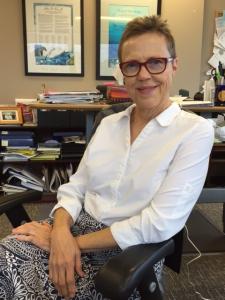Rebecca Lent

Voices from the Science Centers
Voices from the Science Centers is an oral history initiative dedicated to documenting the institutional knowledge of fisheries scientists and administrators in the labs of NOAA’s Fisheries Science Centers.
Dr. Rebecca Lent knew she would study economics in college after taking a course in high school. She obtained her Bachelor degree in Economics from University of California San Diego and her Master’s degree from San Diego State. After graduation, she worked at Oregon State University in the economics of the salmon industry. While there, she pursued a Ph.D. in Marine Economics graduating in 1984. Dr. Lent worked in academia for 10 years in Quebec before beginning her career at NOAA Fisheries in 1992. Over her 22 years at NOAA Fisheries, she served as an economist, a Division Chief, a Senior Executive, Deputy for Regulatory Programs, and the head of the International Fisheries Office before becoming the Executive Director of Marine Mammal Commission in 2013.
Interview contains discussions of: Marine Mammal Commission, marine mammals, Deepwater Horizon, individual transferable quotas, sustainable management, World Bank, highly migratory species, underwater acoustics devices, U.S. Navy, whales, drones, cryptic mortality, Alaska Native Harvest, Arctic, subsistence, traditional environmental knowledge, Tuna Regional Fishery Management Organizations, Kobe Plot, Kobe 2 Strategy Matrix.
Dr. Lent discusses her career at both NOAA Fisheries and the Marine Mammal Commission. She compares MMC and NOAA Fisheries and her ability to be proactive and focus on the big 3 picture at MMC versus the day to day work at NOAA Fisheries. She describes how economics can help with the protection and preservation of marine mammals while also positively impacting the commercial fishing regulations. In addition, she spent time working on international fisheries especially focusing on highly migratory species.
In her role as Executive Director at MMC, she has implemented a variety of changes one of which was a listening session in Barrow, Alaska meeting with the Natives to hear about the impact climate change has on their lives. She is proud of the work she has done throughout her career and recounts how she is considered the Mother of Kobe 2 Strategy Matrix used by the Tuna Regional Fishery Management Organizations.
Please Note: The oral histories in this collection are protected by copyright and have been created for educational, research and personal use as described by the Fair Use Doctrine in the U.S. Copyright law. Please reach out Voices@noaa.gov to let us know how these interviews are being used in your research, project, exhibit, etc. The Voices staff can help provide other useful resources related to your inquiry.
The NOAA mission is to understand and predict changes in climate, weather, oceans, and coasts, to share that knowledge and information with others, and to conserve and manage coastal and marine ecosystems and resources. The Voices Oral History Archives offers public access to a wide range of accounts, including historical materials that are products of their particular times, and may contain offensive language or negative stereotypes.
Voices Oral History Archives does not verify the accuracy of materials submitted to us. The opinions expressed in the interviews are those of the interviewee only. The interviews here have been made available to the public only after the interviewer has confirmed that they have obtained consent.
